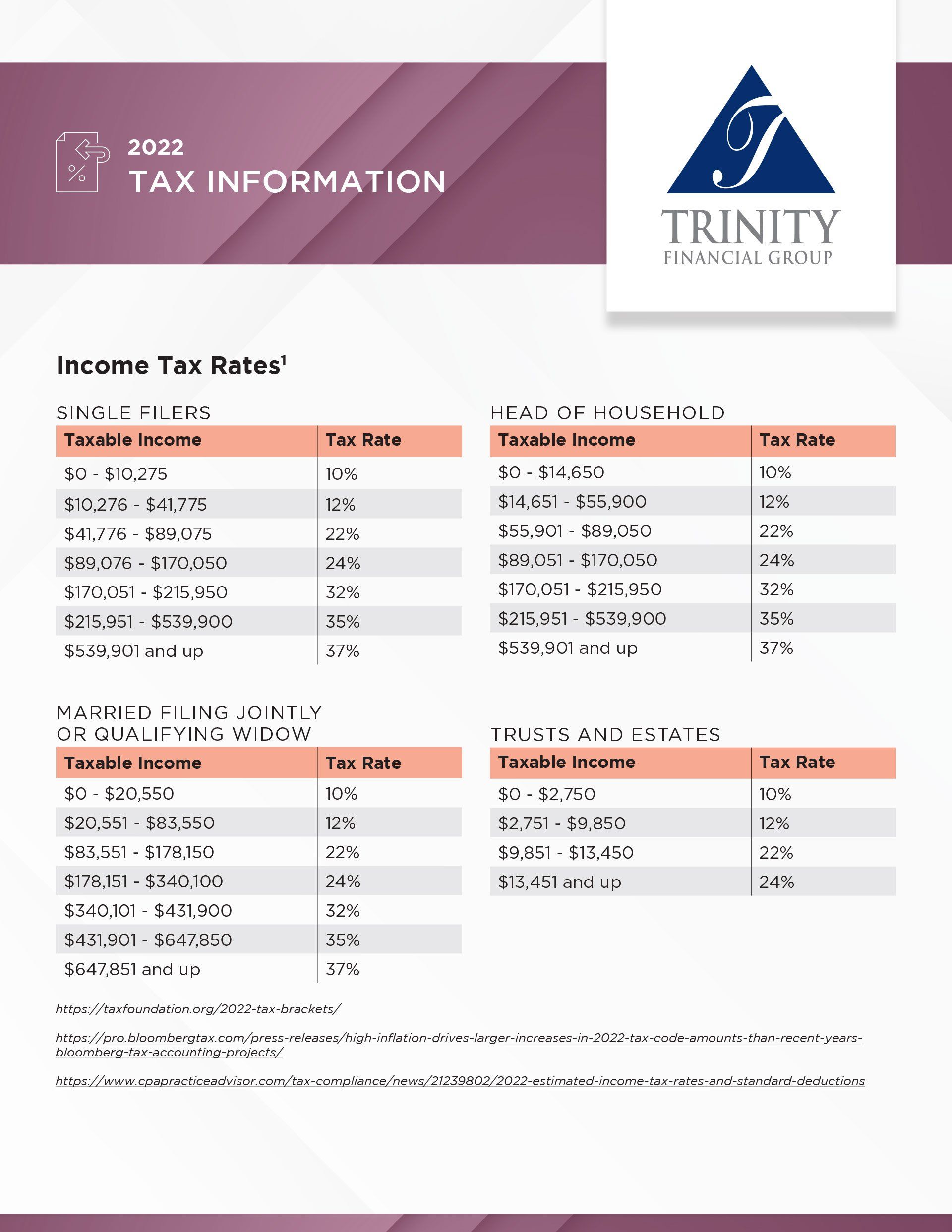Tax-Reduction Strategy Services
Protect yourself and your assets from taxes in retirement.
Your Partner in Retirement Planning
You may stop working, but that doesn’t mean you stop paying taxes. In fact, taxes could be one of the largest expenses you pay in retirement. The good news is you can limit your tax exposure and potentially reduce your bill with forward-thinking planning strategies.
At Trinity Financial Group, we consider taxes in everything we do. From investment strategies to retirement income planning and even to estate planning, taxes can impact every aspect of your financial life.
We develop and implement strategies to help reduce your tax exposure so you can enjoy more of what you love in retirement.
What taxes will you face in retirement?
The specific taxes you may face in retirement depend on your situation, but it’s likely that you will continue to pay income taxes after you stop working. Many common sources of retirement income are potentially taxable, including:
- Distributions from retirement accounts like 401k plans, IRAs, profit sharing plans, and more
- Social Security distributions
- Annuity income
- Defined Benefit Pension benefits
- Wages
- Business income
- Rental property income
- And much more
The taxes don’t stop with federal income taxes though. There are other taxes you could face depending on your financial situation and where you live. Some examples include:
- State and local taxes
- Property taxes
- Medicare premiums
- Capital Gains taxes
- Sales tax
- Gift taxes
- Estate taxes
- And more
Every dollar you pay in taxes is a dollar that can’t be used to support your retirement goals. We help you implement strategies that can potentially reduce your tax exposure and maximize your family’s financial wellbeing in retirement and beyond.

Do you have a retirement tax minimization strategy?
Download our complimentary Retirement Taxes Cheat Sheet to learn more about taxes in retirement.
How can you protect yourself from taxes in retirement?
Every client’s situation is unique, which means the strategies we recommend and implement vary from client to client. However, there are some general ideas and strategies that we frequently consider:
-
Retirement Income Planning
Retirement income arrives in a few different forms when it comes to taxes.
-
Taxable
This is income that is fully taxed as income as you receive it. Examples include distributions from 401(k) plans, traditional IRAs, 403(b) plans, profit sharing plans, wages, and more.
-
Tax-Free
This is income that you receive in retirement and is not taxed as income. This includes distributions from eligible Roth IRAs, municipal bond interest, and potentially life insurance distributions.
-
Potentially Taxable
This is income that could be taxable depending on a variety of factors. The most notable example of this is Social Security benefits, which can be taxable at different levels based on your overall income.
You can manage your tax exposure by strategically planning how you take income from each type of source. For example, you can maximize your tax-free income and minimize your taxable income to lower your exposure.
You can also make a wide range of choices with regard to Social Security, especially with when you file for benefits. This can impact your taxable income and affect your overall tax rate.
We help you navigate the complexities and implement an income plan that meets your objectives and manages your income tax exposure.
-
Investment Planning
Your investment portfolio can significantly impact your tax exposure in retirement. There are many investment outcomes that affect your taxes, including:
- Selling for a gain
- Selling for a loss
- Interest income
- Dividend income
- Investments with tax-free income like municipal bonds
- Tax-deferred investment vehicles
- And more
Taxes are one part of the equation when it comes to investment management. Our investment management process weighs all factors, including taxes, risk management, and performance objectives to find the right portfolio and strategy and objectives.
-
Legacy Taxes
Yes, you (or your family) could continue to pay taxes on your assets and earnings after you pass away. You could face:
- Probate fees
- Final year taxes
- Taxes on taxable retirement accounts like 401(k) plans and IRAs
- Estate taxes
- And more
A comprehensive estate plan is a critical piece of your financial puzzle. An estate plan can serve a few important purposes. It makes life easier for your loved ones because it provides them with clear instructions after your passing. It protects your assets after your death and even before you pass away. And it can even protect your health care wishes during your final days.
Estate plans can vary greatly. We craft an estate strategy that meets your wishes and objectives and minimizes unnecessary costs after your passing. That maximizes your legacy and allows you to provide support for your loved ones even after you pass away.
What’s your tax minimization strategy?
As the saying goes, taxes is one of only two certainties in life. We can’t eliminate taxes, but we can help you prepare for them. Time is one of your most powerful assets. The sooner you start planning for future taxes, the more options you’ll have available.
Let’s start the conversation today about your tax minimization strategy and your overall financial goals. Schedule a consultation today and let’s start the process.
Ready to start a conversation?
Developing your custom retirement plan begins here. We’ll spend 15 minutes getting to know you and your needs to match you with an advisor committed to helping you achieve your retirement goals.
Fields marked with a * are required.
Fill out the form below and a member of our team will be in touch with you shortly.
We will get back to you as soon as possible
Please try again later
¹https://www.ssa.gov/policy/docs/quickfacts/stat_snapshot/
²https://www.ssa.gov/oact/quickcalc/earlyretire.html
³https://www.ssa.gov/benefits/retirement/planner/delayret.html
⁴https://www.ssa.gov/benefits/retirement/planner/taxes.html
⁵https://www.cnbc.com/2021/09/01/americans-are-behind-on-retirement-savings-heres-how-to-get-on-track.html
⁶https://www.fidelity.com/viewpoints/personal-finance/plan-for-rising-health-care-costs
⁷https://www.federalreserve.gov/publications/2021-economic-well-being-of-us-households-in-2020-retirement.htm
Advisory Services Offered Through CreativeOne Wealth, LLC an SEC Registered Investment Advisor. Trinity Financial Group and CreativeOne Wealth, LLC are not affiliated.
Licensed Insurance Professional. We are an independent financial services firm helping individuals create retirement strategies using a variety of investment and insurance products to custom suit their needs and objectives. This material has been prepared for informational and educational purposes only. It is not intended to provide, and should not be relied upon for, accounting, legal, tax or investment advice. 22219 - 2022/9/13
Investing involves risk, including the loss of principal. No Investment strategy can guarantee a profit or protect against loss in a period of declining values. Any references to protection benefits or lifetime income generally refer to fixed insurance products, never securities or investment products. Insurance and annuity products are backed by the financial strength and claims-paying ability of the issuing insurance company.
Trinity Financial Group does not provide legal advice and cannot draft legal documents. We work with experienced CPA’s, tax planners and estate planning attorneys who develop the legal documents that express a client’s estate planning intentions. We are pleased to work with a client’s current estate planning attorney, CPA®, and other advisers.
Investment advisory services are provided in accordance with a fiduciary duty of care and loyalty that includes putting your interests first and disclosing conflicts. Insurance services have a best interest standard which requires recommendations to be in your best interest. Advisors may receive commission for the sale of insurance and annuity products. Additional details including potential conflicts of interest are available in our firm's ADV Part 2A and Form CRS (for advisory services) and the Insurance Agent Disclosure for Annuities form (for annuity recommendations).


